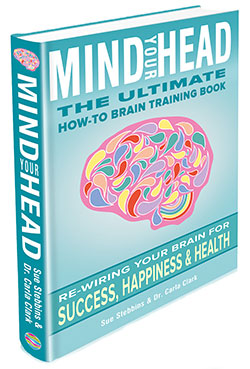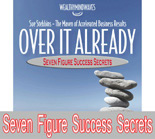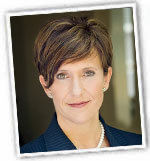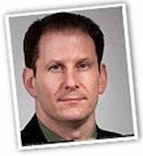About Successwaves.com and Sue Stebbins
Page 2
"What's the second most important thing?"
Watch how you think - your individual thoughts and your attitudes. Most people have no idea how much hostility, fear, insecurity, self-hate and self-rejection they have. Those are negative mental habits that contribute to lowered resistance to stress and create serious blocks to happiness, fulfillment and personal productivity.
Over time our beliefs and unconscious thinking patters contribute to all sorts of physiological and emotional consequences. Joan Borysenko, author of Healing the Mind-Mending the Body, talks about the way the body absorbs these powerful thought toxins and how our thinking patterns and negativity set the stage for "dis-ease". We may develop asthma because of a subtle lack of self-confidence, ulcers because we have a habit of not expressing ourselves, and even cancer because we've learned to feel hopeless and helpless about life. The consequences of sustained negative mental chatter are really quite serious.
"What do you see most often as the biggest block for people?"
Self-critical beliefs developed in childhood that are operating without our awareness. For instance, feeling we aren't smart enough or only if we're mega successful will we finally be happy. This leads to the chasing success, never get off the merry go round syndrome of Type A personality.
Most people don't feel confident enough, attractive enough, or successful enough. They feel insecure about taking risks and new challenges. Often deep rooted feelings and habits from unconscious perceptions of ourselves as limited and we end up settling for less than what we could achieve if we were to become conscious of our reactions. If these early childhood patterns are pathological we can become very judgmental about ourselves and others, become depressed and/or neurotic, and constantly fearful of other's options.
What most people have accepted, and which was championed by the late B.F. Skinner, is that we are products of, and are controlled by our environment, and therefore, if something pushes our buttons, there is little we can do. What Skinner and other behaviorists never realized is that the laws and principles that define habits only apply as long as the habit remains on the unconscious level. The moment we become conscious of the habit we pin the ability to control the behavior. Since all habits are stored information, or memories in the unconscious, we can re-program the habit for a desired end result.
"Give us an example of re-programming a habit."
When a compulsive eater, for example, becomes overly stressed, he will start snacking. He says that he is hungry, but his hunger is not really for food - it is the conditioned response to a high level of tension which eating temporarily reduces. Unfortunately, eating doesn't satisfy the underlying problem.
The compulsion to eat stems from an emotional pattern or series of triggers and conditioned responses that are hidden in the unconscious. Try as one might to control their eating through willpower or intellect, they seem to be caught up in a battle over their habits. They are out of touch with their unconscious triggers that are habituated by unproductive coping strategies learned in the past. Bringing this to consciousness and providing new coping behaviors to the subconscious would result in a changed outcome, reduced frustration, and a new feeling of self-control and mastery. We can learn to focus our attention inward where we can work with the cause and effect relationship between thoughts and behaviors. The more aware we become, the more apt we are to choose a different behavioral response, and thus, a different way of thinking.
"How do you support people in becoming aware of their limiting unconscious choices?"
Through awareness exercises that uncover the thinking that is producing a negative, or less than ideal result, and by "re-framing", or constructing the way the solution or ideal outcome would be experienced.
My clients are supported by custom audio programs tailored to their individual needs that combine positive visualizations and suggestions to re-program negative or unwanted conditioning. Since the subconscious mind makes no distinction between what is real and not real, the tapes work to eliminate negative programs and create positive affirming ones. They are amazed at how much easier making change becomes when they harness the power of the subconscious mind, which in turn helps them to focus, and thus - succeed.
"What time frame are we talking about before people see results?"
Most programs run about 13 to 20 minutes and require listening to them undistracted twice a day preferably in the morning before getting out of bed, and in the evening before retiring. People tell me they enjoy listening to them in the middle of the day to reduce stress and to aid in staying balanced and centered.
For the most part people will feel a shift, or a lessening of undesirable thoughts and behaviors immediately. While each person is different, it takes approximately 21 days to recondition a habit.
What has been interesting to observe is that regardless of what is being reconditioned, people consistently report secondary benefits of greatly enhanced self-acceptance and confidence, higher resistance to stress, and a heightened sense of well being. This all helps to free up additional energy to make continued positive progress in their lives that is not forced or strained.
Sue, thank you for sharing your knowledge of the benefits of developing our inner resources for positive results and "Response-Ability" through meditation and hypnosis. If anyone is interested in speaking with Sue about a consultation or Successwaves custom audio program, they can reach her by calling 203-831-8344.
We Make it Easy to Succeed
Successwaves, Intl.
Brain Based Accelerated Success Audios
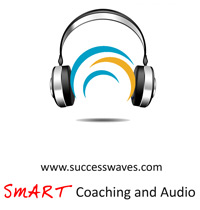 |


